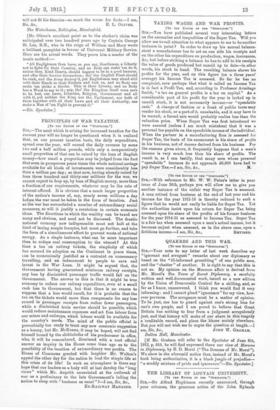TAXING WAGES AND WAR PROFITS.
[To nis EDITOR Or TIIl "Finecreros."1 SIR,—You have published several very interesting letters on the anomalies and inequalities of the Super Tax. Will you allow me to call attention to what appears to me to be another instance in point P In order to draw up his annual balance- sheet a manufacturer has to set on one side his receipts and on the other his expenditure on production, wages, insurances, &c.; but before striking a balance he has to add to his receipts the value of goods produced but unsold up to date—in other words, his stock in hand. The resulting balance shows his profits for the year, and on this figure (on a three years' average) his Income Tax is assessed. So far he has no complaint, save perhaps that what is called an Income Tax is in fact a Profit Tax, and, according to Professor Armitage Smith, "a tax on general profits is a tax on capital." As a considerable part of his profit for the year is locked up in unsold stock, it is not necessarily income—or "spendable cash." A change of fashion or a freak of public taste may render his stock, or a part of it, unsaleable, and it may have to be wasted; a forced sale would probably realize less than the valuation price. When Super Tax was first introduced we were assured (unless I am much mistaken) that it was a personal tax payable on the spendable income of the individual. When the partner in a manufacturing firm is assessed for Super Tax, the basis of his assessment is his share of profits in his business, not .of income derived from his business. For the reasons given above, it frequently happens that a man's income is very much less than his share of profits. The result is, as I can testify, that many men whose personal " spendable " incomes do not approach £5,000 have had to
pay Super Tan—I am, Sir, &o., M.










































 Previous page
Previous page